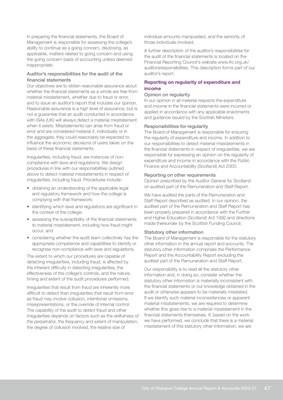
47
City of Glasgow College Annual Report & Accounts 2020-21
In preparing the financial statements, the Board of
Management is responsible for assessing the college's
ability to continue as a going concern, disclosing, as
applicable, matters related to going concern and using
the going concern basis of accounting unless deemed
inappropriate.
Auditor's responsibilities for the audit of the
financial statements
Our objectives are to obtain reasonable assurance about
whether the financial statements as a whole are free from
material misstatement, whether due to fraud or error,
and to issue an auditor's report that includes our opinion.
Reasonable assurance is a high level of assurance, but is
not a guarantee that an audit conducted in accordance
with ISAs (UK) will always detect a material misstatement
when it exists. Misstatements can arise from fraud or
error and are considered material if, individually or in
the aggregate, they could reasonably be expected to
influence the economic decisions of users taken on the
basis of these financial statements.
Irregularities, including fraud, are instances of noncompliance with laws and regulations.
We design
procedures in line with our responsibilities outlined
above to detect material misstatements in respect of
irregularities, including fraud. Procedures include:
• obtaining an understanding of the applicable legal
and regulatory framework and how the college is
complying with that framework;
• identifying which laws and regulations are significant in
the context of the college;
• assessing the susceptibility of the financial statements
to material misstatement, including how fraud might
occur; and
• considering whether the audit team collectively has the
appropriate competence and capabilities to identify or
recognise non-compliance with laws and regulations.
The extent to which our procedures are capable of
detecting irregularities, including fraud, is affected by
the inherent difficulty in detecting irregularities, the
effectiveness of the college's controls, and the nature,
timing and extent of the audit procedures performed.
Irregularities that result from fraud are inherently more
difficult to detect than irregularities that result from error
as fraud may involve collusion, intentional omissions,
misrepresentations, or the override of internal control.
The capability of the audit to detect fraud and other
irregularities depends on factors such as the skilfulness of
the perpetrator, the frequency and extent of manipulation,
the degree of collusion involved, the relative size of
individual amounts manipulated, and the seniority of
those individuals involved.
A further description of the auditor's responsibilities for
the audit of the financial statements is located on the
Financial Reporting Council's website www.frc.org.uk/
auditorsresponsibilities. This description forms part of our
auditor's report.
Reporting on regularity of expenditure and
income
Opinion on regularity
In our opinion in all material respects the expenditure
and income in the financial statements were incurred or
applied in accordance with any applicable enactments
and guidance issued by the Scottish Ministers.
Responsibilities for regularity
The Board of Management is responsible for ensuring
the regularity of expenditure and income. In addition to
our responsibilities to detect material misstatements in
the financial statements in respect of irregularities, we are
responsible for expressing an opinion on the regularity of
expenditure and income in accordance with the Public
Finance and Accountability (Scotland) Act 2000.
Reporting on other requirements
Opinion prescribed by the Auditor General for Scotland
on audited part of the Remuneration and Staff Report.
We have audited the parts of the Remuneration and
Staff Report described as audited. In our opinion, the
audited part of the Remuneration and Staff Report has
been properly prepared in accordance with the Further
and Higher Education (Scotland) Act 1992 and directions
made thereunder by the Scottish Funding Council.
Statutory other information
The Board of Management is responsible for the statutory
other information in the annual report and accounts. The
statutory other information comprises the Performance
Report and the Accountability Report excluding the
audited part of the Remuneration and Staff Report.
Our responsibility is to read all the statutory other
information and, in doing so, consider whether the
statutory other information is materially inconsistent with
the financial statements or our knowledge obtained in the
audit or otherwise appears to be materially misstated.
If we identify such material inconsistencies or apparent
material misstatements, we are required to determine
whether this gives rise to a material misstatement in the
financial statements themselves. If, based on the work
we have performed, we conclude that there is a material
misstatement of this statutory other information, we are